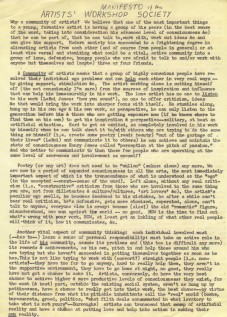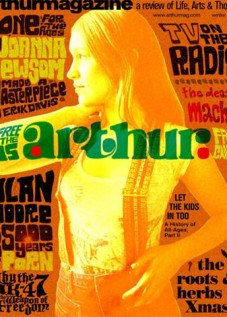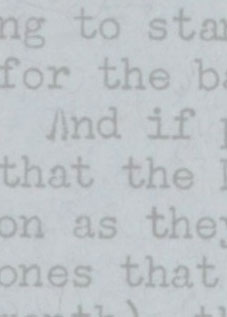The Artists’ Workshop Society: A “Manifesto”
THE ARTISTS’ WORKSHOP SOCIETY: A “MANIFESTO”
By John Sinclair
1 November 1964
Why a community of artists? We believe that one of the most important things to a young, formative artist is having a group of his peers (in the best sense of the word, taking into consideration his advanced level of consciousness &c), that he can be a part of, that he can talk to, work with, work out ideas, &c and can give him support. Modern society has succeeded to a frightening de¬gree in alienating artists from each other (and of course from people in general; or at least vice versa) and atomizing what could be a vital, active community into a group of lone, defensive, hungup people who are afraid to talk to and/or work with anyone but themselves and (maybe) three or four friends.
A community of artists means that a group of highly conscious people have resolved their individual, ego problems and can help each other in very real ways – by giving support, stimulation &c. The artist working alone is cutting himself off from (tho not consciously I’m sure) from sources of inspiration and influence that can help him immeasurably in his work. The lone artist has no one to listen to his work (Leroi Jones: “how you sound”), no one to offer criticism, ideas &c that would bring his work into sharper focus with itself. He stumbles along, hung up in his own ego & his own work, no perspective, he can only listen to the generations before him & those who are getting exposure now (if he knows where to find them on his own) to get his inspiration & perspective – solitary, at best an artificial situation. Hard to get as excited, as completely involved in his work by himself; when he can talk about it with/to others who are trying to do the same thing as himself (i.e., create some poetry (read:beauty) “out of the garbage of their lives” (LeRoi) and communicate it to others) he can achieve and maintain the state of con-sciousness Henry James called “perception at the pitch of passion.” And who better to communicate to than those few people who are operating at the same level of awareness and involvement as oneself?
Poetry (or any art), does not need to be “sullen” (solus:alone) any more. We are now in a period of expanded consciousness in all the arts, the most immediately important aspect of which is the transcendence of what is understood as the “ego” (in the accepted – worst – sense of that word). Left alone without any real criticism (i.e., “constructive” criticism from those who are involved in the same thing you are, not from dilletants & culture/vultures, ‘art lovers’ &c), the art¬ist’s peculiar ego swells, he becomes deadened to his mistakes, he, after a while can’t bear real criticism, he’s defensive, gets more atomized, separated, alone, can’t talk to anyone, everyone else is crazy: becomes (alas!) the old “romantic” figure, misunderstood, one man against the world – no good. NOW is the time to find out what’s wrong with your work, NOW, at least get an inkling of what other real people will think of it, how it communicates, &c.
Another vital aspect of community thinking: each individual involved must (– has to – ) learn a sense of personal responibility: must take an active role in the life of his community, assume its problems and (this is too difficult any more) its rewards & achievements, as his own, pitch in and help those around him who are trying but who haven’t succeeded in getting themselves together as soon as he has. This is not like trying to work with (convert?) straight people (i.e., non-artists) – they have too far to go anyway, hard to really help them, they aren’t in a supportive environment, they have to go home at night, no good, they really have not got a chance to make it. Artists, conversely, do have the very best chance to achieve higher & more productive levels of consciousness: they exist, for the most (& best) part, outside the existing social system, aren’t hung up by pettiness, have a chance to really get into their work, the best chance – by virtue of their distance from what its pitiable inhabitants call the “real” world (bombs, bureaucrats, greed, politics, “what filth deals consummated in what lavatory to take what is not yours” – [William] Burroughs), artists can transcend that swamp of artificial reality and have a chance at putting love and help into action in making their own reality.
So: what we want is a place for artists – musicians, painters, poets, writers, film-makers – who are committed to their art and to the concept of community involvement to meet and work with one another in an open, warm, loving, supportive environment (– what they don’t get in the “real” world) – a place for people to come together as equals in a community venture the success of which depends solely upon those involved with it. To this end we have acquired a “studio” workshop which will be maintained (rent, electricity, heat) by the artists themselves, through individual subscriptions of $5.00 each (i.e. initial investment – the pledge will be adjusted, on a monthly basis, and probably downward, as the Workshop program is totally implemented and we have a concrete figure for maintenance costs.) This method of supporting the Artists Workshop is necessary, we feel, because:
1) Each member of the Workshop is to assume an equal responsibility in the project’s success;
2) Members have to go into their already near-empty pockets, thus the project cannot be treated lightly;
3) We feel that any commercial means of support, at leats (& especially) in the beginning, would tend to create an artificial community hung together on money, rather than a genuine community built on mutual need and mutual support and interest;
4) No “outside” pressures, hangups, interferences;
5) The Workshop ideal can be maintained, i.e. there will be no pressure on artists to produce work that would have commecial success, rather than integrity and aesthetic honesty, as its ultimate purpose.
 We do believe, however, that commercial ventures will come into being as logical and desireable outgrowths of the Workshop as it has been conceived and as it is now operating. For example, we can see in the future a coffeeshop where musicians would present their work; a gallery for painters and other graphic artists to exhibit their work; a small printing and/or publishing concern through which poets & writers could introduce their work; an operating film society that would enable local film-makers to produce and possibly market cinematic ideas.
We do believe, however, that commercial ventures will come into being as logical and desireable outgrowths of the Workshop as it has been conceived and as it is now operating. For example, we can see in the future a coffeeshop where musicians would present their work; a gallery for painters and other graphic artists to exhibit their work; a small printing and/or publishing concern through which poets & writers could introduce their work; an operating film society that would enable local film-makers to produce and possibly market cinematic ideas.
Other individual projects that are being planned as part of the workshop’s total program: lectures on modern music, painting, poetry and film, by the artists themselves, that would serve to introduce & enlighten an often-puzzled public to the artists’ aims, purposes, & finished work; free jazz concerts and workshops, featuring in particular the work of Detroit’s musical ‘avant-garde,’ with commentary on their work by the musicians themselves and by enlightened critics & students of the music; interpretive poetry readings, with background and explanatory commentary by the poets; screenings of films by Detroit experimenters and by independent film-makers from New York and San Franscisco who are involved in what has been called the “New American Cinema,” and whose work is not readily available, via commercial theaters, to its eager audience. All these will be “free,” non-commercial affairs that are planned, programmed, & produced by the artists themselves.
We sincerely believe that our Artists Workshop Society can and will succeed: the time is over-ripe, the people are ready to convert their ideals into real action, there is no real reason why we can’t make it. We need all the support we can get, especially your spiritual support and blessing; we are trying to establish ties with the isolated groups of artists that exist in this country and throughout the universe, and we sincerely wish to cooperate with anyone who will let us. Please help.
ARTISTS WORKSHOP SOCIETY
John Sinclair Robin Eichele
Charles Moore George Tysh
Larry Weiner Danny Spencer
James Semark Richard Tobias
Gayle Pearl Allister McKenzie
Ellen Phelan Paul Sedan
Bill Reid David Homicz
Joe Mulkey Bob Marsh
Tags: John Sinclair, Manifesto






